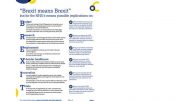Government plans to provide up to 1,000 nursing degree apprenticeships a year will cost NHS trusts in England about £200 million annually, Chief-exec.com has been told.
A Department of Health spokesman said each trust would help fund the NDAs programme through the Government’s new apprenticeship levy scheme – applied equally to public and private sector organisations – that comes into effect in April next year. The trusts would then be expected to contribute 0.5 per cent of pay bill.
“This is expected to total around £200 million annually, and equates to only 0.2 per cent of total NHS spending,” he said. “This will help to double spending on apprenticeships.”
Christina McAnea, the head of health at UNISON, the public service union, said the money NHS employers would have to pay into the levy scheme would have to come from other parts of “cash-strapped” hospital budgets.
“There is a risk that levy contributions will be taken from existing training and development budgets and could squeeze money available for other forms of continuing professional development,” she said yesterday.
There are still important questions to resolve about some important aspects of the [nursing degree] apprenticeship that do not easily fit with Nursing and Midwifery Council standards
The Department of Health was responding to questions from Chief-exec.com following a statement last week from the Health Secretary Jeremy Hunt and issued before addressing the NHS Providers conference in Birmingham. It said that the first apprentice nurses could be working on wards from September and, once established, up to 1,000 apprentice nurses could join the NHS each year.
“Earlier this year the government committed to creating 100,000 apprenticeships within the NHS by 2020 to ensure it has a workforce with the right support, skills and numbers to provide consistently safe, high quality care 24 hours a day, 7 days a week,” Mr Hunt’s statement said.
“… A range of roles will be created, from pharmacy services assistants to associate ambulance practitioners, as well as in areas including IT, hospitality and facilities.”
The NHS in England has a vacancy rate of about 10 per cent or 21,000 full-time jobs.
A spokesman for the Council of Deans of Health (CoDH) – which represents the UK’s university faculties engaged in education and research for nurses, midwives and allied health professionals – said it did not know the origin of the Government’s 1,000 NDAs figure but, given that setting up apprenticeships took a significant amount of time, the Council would expect the figure to include those already announced and funded by the Higher Education Funding Council of England (HEFCE).
Last month HEFCE said a £4.5 million development fund established by the government was expected to provide up to 5,200 degree apprenticeships by September 2017. This included nursing degree apprenticeships and nursing associate apprenticeships.
Of the 18 universities/consortia named, four offered nursing degree apprenticeships and one offered nursing associate apprenticeships.
When contacted by Chief-Exec.com only one, the University of Derby, could say how many NDAs it was likely to offer – about 30. Three said they were still in the planning stage. The University of Wolverhampton planned to offer 100 nursing associate apprenticeships.
The £4.5m development fund is for things such as curriculum design and development, collaboration activity with employers and making partnerships with other higher education institutions.
Detailed work is currently being carried out [by Guy’s and St Thomas’ NHS Foundation Trust in London] to budget for the other costs involved
The CoDH spokesman said nursing degree apprenticeships had to meet the same standards, set by the Nursing and Midwifery Council (NMC) on a UK-wide basis and go through the same approval process. A number of universities were working with employers to see if the NDA model could be implemented.
“Our concerns would be that there are still important questions to resolve about some important aspects of the [nursing degree] apprenticeship that do not easily fit with NMC standards, such as end point assessment and that the resourcing – for universities, employers and the new apprentices themselves – needs to be thoroughly thought through,” he said.
A spokeswoman for Guy’s and St Thomas’ NHS Foundation Trust in London – one of the country’s largest teaching hospitals – said it would not know the number of nursing degree apprentices that it would train until the universities it currently takes students from (London Southbank and King’s College, London) received NMC approval.
It would not know the cost of funding the nursing degree apprenticeships until it knew the number of NDAs enrolled. The Trust would be able to claim the education part of the course from the HMRC, but would have to pay the salary component.
“Detailed work is currently being carried out to budget for the other costs involved,” she said.
The Department of Health spokesman said levy payments would appear as vouchers in a digital apprentice service account, which levy payers could spend on the education and training of apprentices. The vouchers would expire after 24 months.
“So there is an incentive for levy payers to spend their levy contribution,” he said. “Money paid into the levy can only be spent on apprentices. Providers will be able to get back more than [they] pay in by training sufficient apprentices.”
By Aban Contractor




